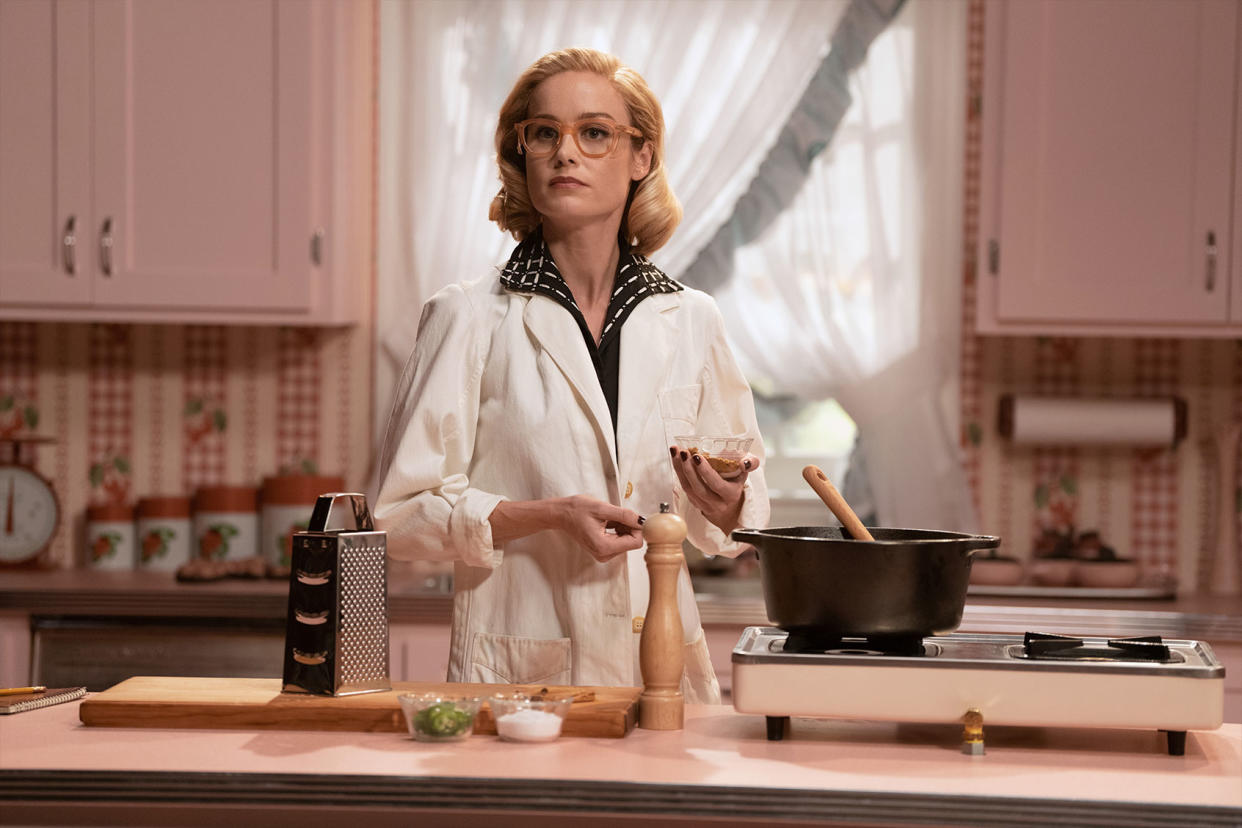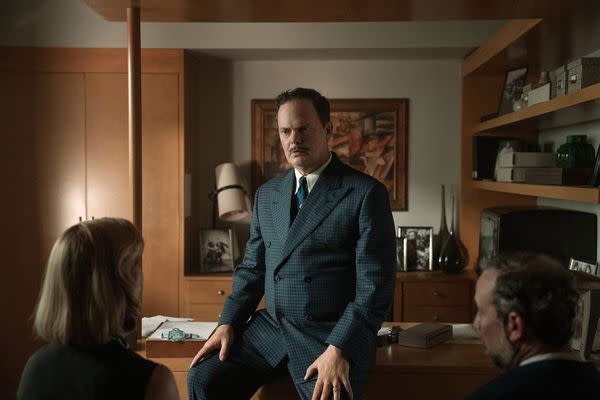"Lessons in Chemistry" understands the assignment: Never forget that cooking is vital work

In the early ‘50s, when women were constantly reminded their place was in the kitchen, Elizabeth Zott (Brie Larson) subversively shapes that myth to suit her needs. Five episodes into “Lesson in Chemistry,” she has lost nearly everything — the love of her life, her job in a prestigious lab where the men in charge refuse to recognize her talents and her groundbreaking research, which was stolen and plagiarized by those same men. She’s also gained new friendship, a daughter — and an unlikely fan in Walter Pine (Kevin Sussman), the overwhelmed, divorced father of one of her girl’s classmates.
While life sifts and stirs around her, Elizabeth’s kitchen is her constant. “It is my lab that I also happen to cook in,” she explains to Walter, adding that she sells Tupperware to pay the bills while she pursues her scientific endeavors.
Walter is a local TV producer in need of something to replace a hilariously soporific embroidery show called “A Stitch in Time.” She is a harried mother who is upset that his daughter is stealing her daughter’s meticulously prepared lunches. Their platonic version of a meet-cute occurs when Elizabeth angrily storms into his office to dress him down for being a sub-par provider.
“As a parent, I will not compromise on good food,” she angrily declares. “Good food is a primary catalyst for which my daughter will grow. Good food is not a hobby. It is community, it is family and it is essential.” Then she provides him with a chicken pot pie recipe, along with a slice she’s prepared so he has a control to work with, and an oatmeal cookie – for his daughter, not him.
Every story about a scientist revels in its eureka moment. “Lesson In Chemistry,” being a eight-episode series, contains many, but takes its time in getting to this confrontation, which is when the proverbial lightbulb switches on for Elizabeth, lighting the path to her new career.
Elizabeth's star-making opportunity isn't simply a matter of luck, although she happens to walk into Walter’s life moments after his pig doggie boss Phil Lebensmal (Rainn Wilson) commands him to fire the sewing “crone” and find him a host who is “maternal” and “f**kable,” a suggestion that makes the good-hearted Walter cringe. It’s in Elizabeth’s assured confidence related to cooking, which she nails in the fifth episode, “CH3OOH,” once she’s accepted Walter’s offer to host a cooking show.
They lock horns a bit as the two argue over the look and feel of the show – he irrationally presents her with a pink and baby blue kitchen that Elizabeth accurately describes as “revolting” and impractical — but on one matter Elizabeth is adamant.
“The thing is, TV needs to be inviting and fun,” Walter tells her.
“Cooking is not fun,” she responds. “It is vital work.”
Reading this may make it seem as if Elizabeth doesn’t enjoy cooking, but that isn’t the case at all. She values it profoundly, which is why she excels at it. She also recognizes that if she doesn’t do it, no one else will – or worse, a diner or restaurant will do the job, but not as healthily or delectably. The products of her efforts bring her satisfaction and joy but, as she says, it still counts as labor.
“I take cooking seriously. And I know you do too,” she tells her audience as she opens her first episode. “In my experience, people do not appreciate the work and sacrifice that goes into being a mother, a wife, a woman. Well, I am not one of those people. At the end of our time here together, we will have done something worth doing. We will have created something that will not go unnoticed. We will have made supper, and it will matter. “
This outlook guides what eventually becomes Elizabeth’s show, “Supper at Six.” But I also wonder how our collective consideration of kitchen labor might have been altered had there been a show like Elizabeth’s in the '50s, '60s or beyond, one so brainy that she lists the formula for acetic acid instead of just saying vinegar, and the people watching aren’t put off but intrigued.
That isn’t the part to which I suspect many home chefs most relate, though. It’s the insistence on respect, which is downplayed in most cooking shows if not left out entirely. Alton Brown’s “Good Eats,” which accessibly emphasizes the science behind kitchen techniques and ingredient combinations, was an exception. In breaking down those principles he underlines the vital importance of the work we do in the kitchen. But nearly every other show starts from an assumption that cooking and baking are fun, magic, nothing but a good time.
There’s no blame meant in my calling this out. Rather, I'm simply saying that approach stands in contrast to the assumption that cooking is somehow a pastime instead of counting as part of what Oxfam estimated in 2020 to be around $10.8 trillion in unpaid labor women and girls contribute to the world economy.
Mind you, as someone who loves her kitchen and was raised on a TV diet of Julia Child’s public television shows, I often do view it as a hobby. When I have a craving for some dish or want to scratch a curiosity about a recipe I’ve never experimented with before, food preparation can be a satisfying, sensory-flooding experience. But I don't have kids to feed, and I also have easy access to takeout options on those nights when I'm not feeling it.
Ask a working parent with several children or anyone obligated to feed a large family if they love to cook, and you may get a different answer. Take my mother-in-law, who grew up on a farm in the 1950s and was sentenced to many years of making meals for a large group of hungry people, mainly ungrateful brothers, every day. Preparing food for people who didn’t appreciate the time and exertion required to feed them was such drudgery that when she finally got her own place, she embraced a life of canned foods and frozen dinners, barely touching her stove.
She watches a lot of TV. None of it is Food Network programming.

That’s why this adaptation of Bonnie Garmus’ book strikes the perfect balance between realism and fantasy. Phil’s sexism feels heightened but sadly still quite accurate by Reddit standards, and Larson’s interpretation of Elizabeth's pointedly precise, low-emotion rebuke of his heinous behavior is work of someone whose spent her entire adult life dealing with men like him.
Want a daily wrap-up of all the news and commentary Salon has to offer? Subscribe to our morning newsletter, Crash Course.
Phil believes the only thing viewers want is to see a sexy housewife making her man a drink. Elizabeth wants her audience to understand the molecular-level wonder that goes into making, say, the skin on roasted chicken crispier; also, she’s a single mother with two jobs.
“Men are always trying to explain, and women are expected to sit and listen,” she says calmly. “I do not want this job, but I need the money. And I will work harder than anyone to make this a show that I am proud of. But you want a show that perpetuates the myth that women are imbeciles, and the biggest decision of their day is what color they're going to paint their nails. I will not do that. And there is no amount of menace that will change my mind.”
“A man wants his wife to make him a drink after a long day at work,” Phil growls, “so make the f**king drink.”
“Why do you assume that his day was longer than hers?” Elizabeth calmly replies. 'Why don't you make the f**king drink?”
Cooking is chemistry, and chemistry is life, Elizabeth assures her audience, in a tone the men in the station’s test group say makes them feel “bored, “punished” and “lost,” while one of the two outnumbered women in the group, when she’s finally allowed to speak, says makes her feel “capable.”
It turns out to be the right alchemic blend for Phil’s low-rated station, proven by the phones ringing off the hook with viewers calling in to find out more about Elizabeth’s scientific approach to supposed women’s work. She's right — cooking is chemistry, and mastering that chemistry is vital, important work. If someone had gotten that message to everyone who took or takes what people do in the kitchen for granted a lot earlier in life, who knows how many more home chef geniuses there'd be?
New episodes of "Lessons in Chemistry" debut Fridays on Apple TV+.
